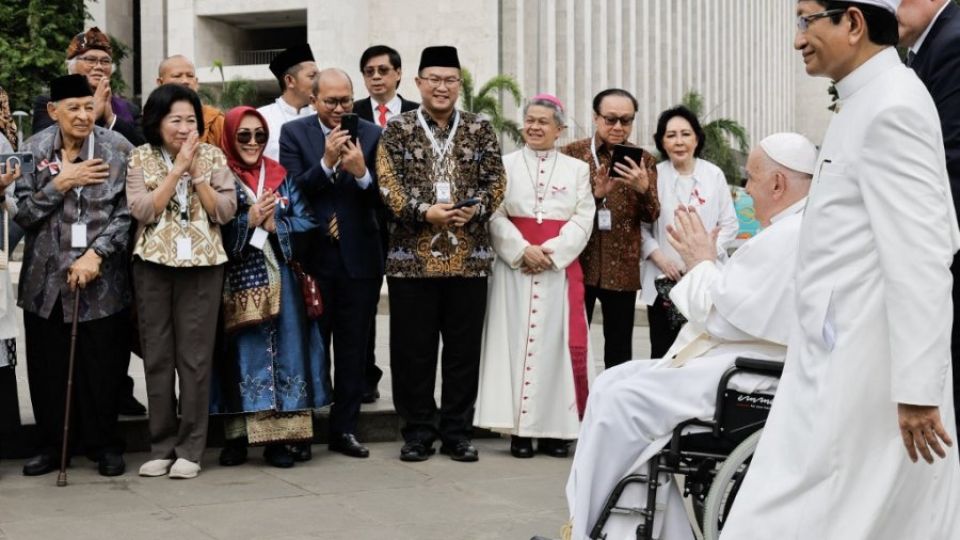September 6, 2024
JAKARTA – Pope Francis ended the last full day of his visit to Indonesia on Thursday by underlining the importance of interfaith dialogue in achieving societal harmony during an interfaith forum and Holy Mass he led in Jakarta.
The pontiff kicked off the third day of his Jakarta tour with a visit to Istiqlal Mosque, the largest in Southeast Asia.
Upon arriving at the mosque, Francis was welcomed by Nasaruddin Umar, Istiqlal’s grand imam, as well as leaders of organizations representing the six officially recognized religions in Indonesia.
The pope and other religious leaders signed a document called the Istiqlal Declaration, a four-point statement urging religious leaders to cooperate to solve the world’s humanitarian and environmental crises.
They also called for interfaith dialogue to be recognized as an effective tool to resolve local, regional and international conflicts, especially “those incited by the abuse of religion”.
“Strengthening religious harmony is something that we must follow, for it is important to tackle many troubles of the world,” Pope Francis said, “especially wars and conflicts that are, unfortunately, triggered by the exploitation of religion, as well as the environmental crisis that endangers humanity.”
Read also: Pope Francis highlights importance of interfaith harmony in Indonesia
The pope, who is also Vatican City’s head of state, has been vocal in his support of ending wars across the globe, including consistently calling for a ceasefire in Gaza.
Nasaruddin echoed Francis, emphasizing the importance of interfaith meetings to solve humanitarian crises and threats of environmental damage. In front of the pope, he said the mosque was seeking to serve as a “place of dialogue” by hosting various interfaith events.
“The Istiqlal Mosque is not only a place of worship but a huge home for humanity,” the grand imam said. “Anyone can enter it to seek [solutions] for the greater good of humanity.”
A woman wearing a headband with images of Pope Francis looks on as people gather to attend a Mass led by the pontiff at Gelora Bung Karno (GBK) Main Stadium in Jakarta during Pope Francis’ visit to the city on Sept. 5, 2024. (Reuters/Guglielmo Mangiapane)
While Indonesians subscribe to a variety of belief systems, including indigenous ones, the country has experienced religious extremism in the past decades.
Among the worst were the 2002 Bali Bombings, committed by the Al-Qaeda-linked Jemaah Islamiyah, which killed more than 200.
Mindful of resources
Interfaith harmony was among the chief messages of Pope Francis’ Jakarta visit.
“Each religion has differing doctrines and dogmas, so the only thing that can bring us close together is the connection that we build amid our differences,” he said.
Indonesia has seen a number of cases of discrimination against religious minorities, including against Christians.
Rights group Amnesty International Indonesia recorded 123 cases of intolerance in the country between January 2021 and July of this year. The cases included the rejection of the construction of houses of worship as well as their forcible closure, often accompanied by assaults from local communities.
A controversial 2006 joint ministerial decree on the construction of houses of worship has been often blamed for such acts of intolerance. It requires a religious group seeking to build a place of worship to obtain 90 signatures from its members and another 60 from the local community, as well as recommendation letters from several institutions.
Read also: At Istiqlal Mosque, Pope appeals for interfaith harmony, unity in tackling climate change
Pope Francis also expressed hope that interreligious dialogue could make Indonesia more mindful of its diversity and richness, including in managing its natural resources.
“If it’s true that you’re the host of the world’s largest gold mine, know that the most valuable asset is the will to not let your differences become a reason for conflict,” the 87-year-old pontiff said.
“Do not waste this gift; never impoverish yourself from this great wealth but instead develop and pass it on to the youths.”
Indonesia has among the largest reserves of gold, copper and nickel of any nation, as well as of other minerals.
Earlier this year, outgoing President Joko “Jokowi” Widodo granted mining permits to major religious groups, a move widely criticized as pork barrel politics intended to buy the organizations’ electoral support.
Perseverance
The pope closed the day with a Holy Mass at the Gelora Bung Karno (GBK) Main Stadium for over 80,000 attendees, who solemnly recited the prayers and sang the hymns throughout the service.
Francis reminded the congregation to live by the words of Jesus Christ. He also called for Indonesians to persevere in the struggle to build “a more just society”.
“Even when we’ve passed through the night of failure and times of disappointment when we caught nothing, we can always risk going out to sea and cast our nets again,” Francis said, as he related Indonesia’s archipelagic nature to the biblical story of Saint Peter, who was a fisherman.
Pope Francis waves from the car as he arrives to lead a Mass at the Gelora Bung Karno (GBK) Main Stadium in Jakarta on Sept. 5, 2024. (AFP/Yasuyoshi Chiba/Pool)
“Do not grow weary of setting sail and casting your nets, do not grow weary of dreaming and building again a civilization of peace.”
The pontiff closed the Mass by thanking Jakarta Archbishop Cardinal Ignatius Suharyo, the Indonesian Bishops Conference (KWI), President Jokowi and the Indonesian people for their prayers and welcome, before leaving GBK for the Vatican Embassy mansion in Central Jakarta.
The pope is scheduled to leave Jakarta at 9:45 a.m. on Friday for Port Moresby, the next leg of his 12-day Asia-Pacific tour, his longest trip to date.


